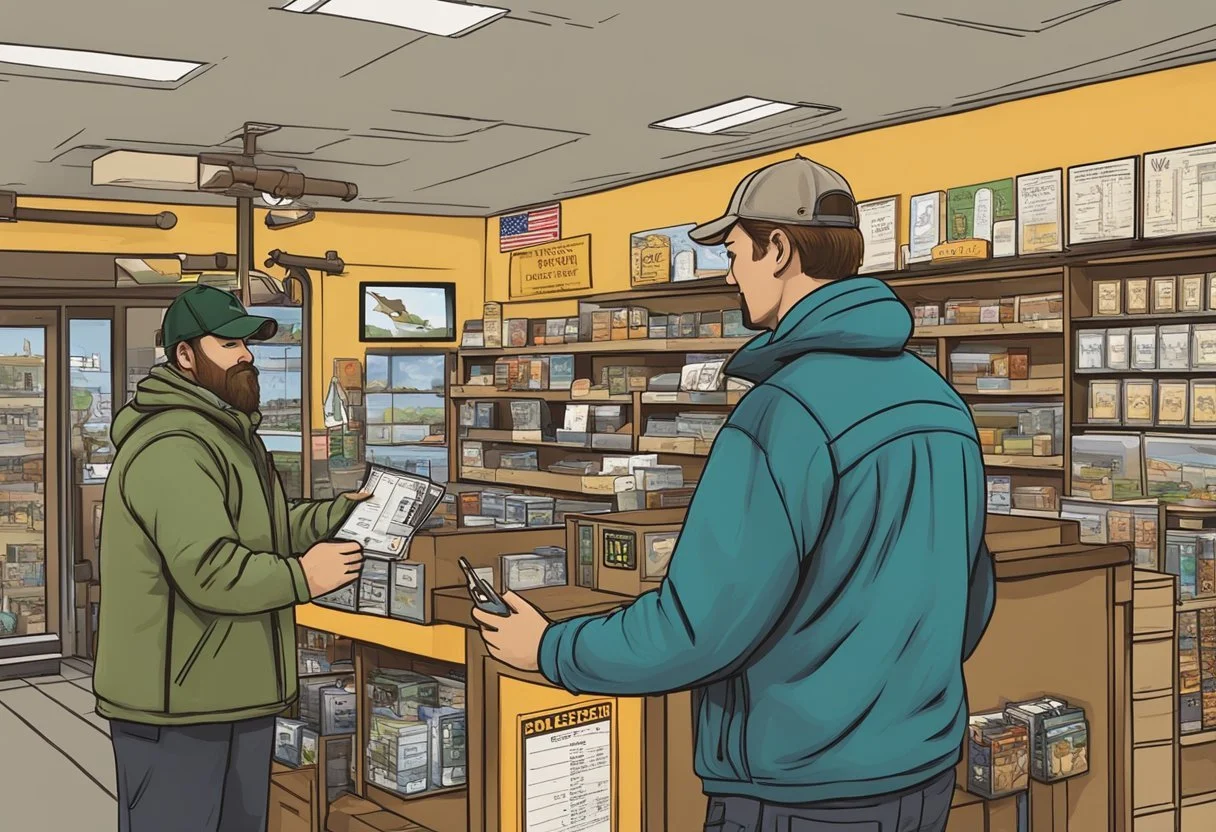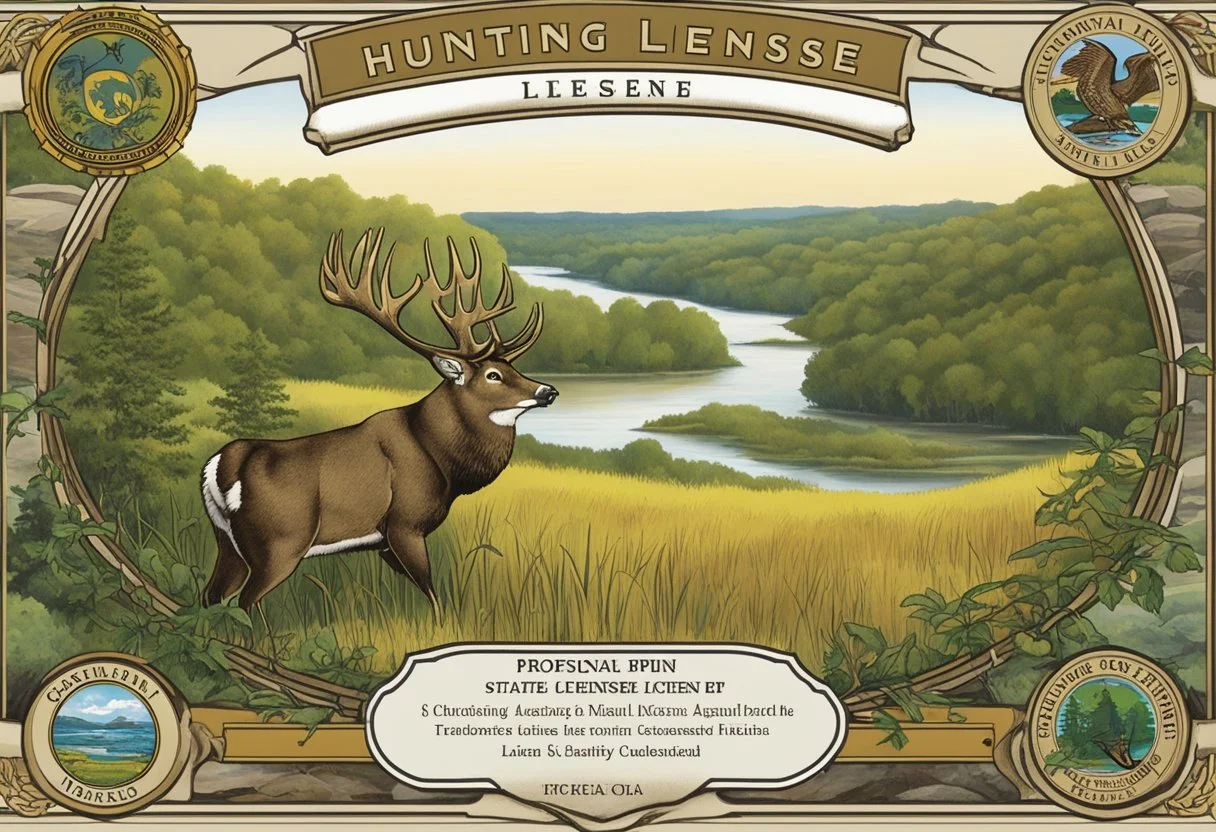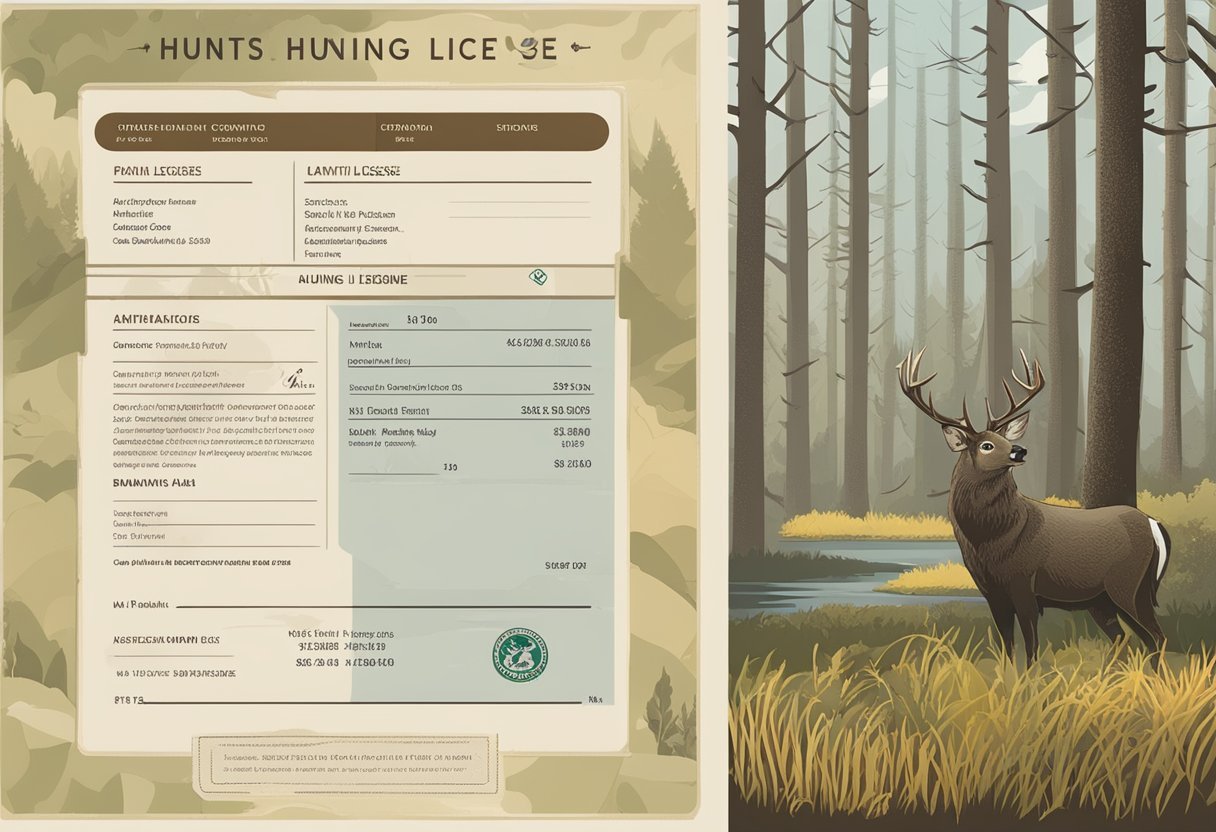How to Get a Iowa Non Resident Hunting License
A 2023 Guide to Regulations and Application
This Article is Part of Our Guide to Non Resident Hunting Licenses by State
Nonresident hunters looking to pursue game in the diverse landscapes of Iowa must navigate a series of regulations carefully crafted to ensure sustainable wildlife populations and fair access to hunting opportunities. An Iowa nonresident hunting license is required for any out-of-state individual seeking to hunt within its borders. These licenses are broken down into different categories based on the type of game, including deer, turkey (What wine goes well with turkey?), and small game, and are available for purchase online through the Iowa Department of Natural Resources or at various retailers.
The process of obtaining a nonresident hunting license in Iowa calls for attention to detail regarding application deadlines, fee structures, and legal hunting implements. Fees for licenses and related habitat fees vary annually, and nonresidents must also be aware of the preference point system that may apply to certain hunts. The validity period for these licenses typically aligns with established hunting seasons, and hunters must ensure compliance with local regulations that govern both the hunting method and the specific time frames.
With wildlife conservation as a guiding principle, the state of Iowa manages its hunting regulations to welcome nonresident hunters while also preserving the natural heritage for future generations. Those interested must acknowledge the importance of adhering to these guidelines to enjoy the full experience of hunting in Iowa, contributing to the state's conservation efforts and local economies. Knowing the correct procedures and timelines is key for a successful and legally compliant hunting trip.
Understanding Iowa Hunting Licenses
Iowa offers distinct hunting licenses to residents and nonresidents, each with its own set of requirements and available game. Acquiring the correct license is essential for adherence to state regulations and conservation efforts.
Resident vs. Nonresident Licenses
Residents of Iowa are eligible for various types of hunting licenses that cater to their specific needs, including a permanent option for disabled veterans. In contrast, nonresidents must obtain appropriate licenses that allow them to hunt legally within the state. Nonresidents can check the status of their deer tag applications, as management of wildlife resources is closely monitored. It is important for nonresidents to remain informed about application deadlines and regulations specific to their license type.
Key License Types
Several key licenses are available for nonresident hunting in Iowa:
Nonresident Deer Hunting License: Vital for those interested in deer hunting.
Nonresident Small Game Hunting License: Required for those hunting species classified as small game.
Residents have similar categories but are also offered a Resident Apprentice License, which was first introduced in 2016. Here's a summarized list of licenses:
Licenses are typically purchased annually and nonresidents can do so online or through authorized retailers. They are also advised to comply with the habitat fee requirement, which supports wildlife habitat conservation efforts.
Nonresident Licensing Requirements
Nonresident hunters must navigate specific criteria to legally hunt in Iowa. The state delineates clear mandates concerning age and educational requirements to ensure adherence to wildlife management and safety standards.
Age-Based Criteria
Nonresidents under the age of 16 are subject to distinct licensing rules in Iowa. They are required to hold a non-resident youth preserve license and must also pay the habitat fee, but if they are hunting under the supervision of a licensed adult, the need for a separate hunting license and habitat fee may be waived. On the contrary, non-residents who are 65 and older must adhere to the standard non-resident licensing protocols, which include purchasing the appropriate hunting license and habitat fee.
Non-residents under 16 (accompanied by a licensed adult):
License Required: No (if accompanied)
Habitat Fee: No (if accompanied)
Non-residents 65 and older:
License Required: Yes
Habitat Fee: Yes
Hunter Education Certification
Hunter education is a cornerstone requirement for nonresident hunters in Iowa, designed to ensure that everyone in the field has a foundational understanding of hunting laws, ethics, and safety practices. All nonresident hunters born after January 1, 1972, must provide proof of having completed a hunter safety and ethics education course before they can purchase a hunting license. The exception to this rule applies to individuals under 16 who may hunt under the supervision of a licensed adult without needing proof of hunter education certification at the time of application.
Hunter Safety Requirements:
Born on or after January 1, 1972: Hunter Education Certificate required
Under 16: May hunt without a certificate when supervised by a licensed adult
Hunting Opportunities in Iowa
Iowa provides a diverse range of hunting opportunities for nonresident hunters, with specific season dates and zones for various game species. The state's managed hunting zones and regulated seasons are designed to both promote wildlife conservation and offer a robust hunting experience.
Game Species
Iowa is well-known for its white-tailed deer, offering both bow and firearm hunting seasons. In addition to deer, hunters can pursue various game, like wild turkey, known for its challenging spring and fall seasons. Waterfowl hunting is another significant draw, with species such as ducks and geese available during migration periods. Here is a brief list of popular game species in Iowa:
White-tailed Deer
Wild Turkey
Waterfowl (including ducks and geese)
Quail (What wine goes well with quail?)
Rabbit
Squirrel
Hunting Zones and Seasons
The state of Iowa is divided into several hunting zones, each with specific regulations and season dates. Seasons are carefully timed to coincide with species migration patterns and breeding cycles. Here's an overview of the hunting zones and their corresponding seasons for the most sought-after game:
†Waterfowl season dates vary annually and are based on migration patterns. Hunters are advised to check the current year's regulations for exact dates.
It is important for hunters to familiarize themselves with the detailed regulations for their target species and zones, as these are subject to change and can affect licensing requirements and legal hunting methods.
Application and Fees
When applying for a nonresident hunting license in Iowa, applicants should consider both the nonresident habitat fee and the license fee. These costs are pivotal for ensuring legal hunting during the designated seasons in Iowa.
License and Habitat Fee Details
Nonresident Habitat Fee: Nonresidents are required to pay a habitat fee along with their hunting license. This fee contributes to conservation efforts and the maintenance of Iowa's natural habitats.
Habitat Stamp: Acquiring a habitat stamp is mandatory for nonresidents and is generally included in the standard habitat fee.
License Fee: The fee for a hunting license varies depending on the type of game and the season. Current fee details can be obtained on the official gooutdoorsiowa.com website.
Application Process
Nonresidents must follow a clear process to successfully apply for a hunting license in Iowa:
Eligibility Confirmation: Ensure you meet all the eligibility requirements, including hunter safety certifications if applicable.
Access gooutdoorsiowa.com: To apply, visit the official licensing portal where you can fill out and submit your application.
Fee Submission: Pay the application fee and the nonresident habitat fee during the application process. This may be done online via the portal.
It is important for applicants to apply within the designated timelines as late applications may not be accepted.
Quotas and Tags
Managing wildlife populations and providing equitable hunting opportunities, Iowa implements a quota system for nonresident hunters. These quotas dictate the number of deer and turkey tags available each season, ensuring a balanced approach to wildlife conservation and hunter success.
Preference Points
Nonresident hunters in Iowa may not always successfully draw a deer tag due to limited availability and high demand. In such cases, they are awarded a preference point for future draws. Preference points increase the chances of drawing a tag in subsequent years, serving as a critical component in the quota system.
Deer and Turkey Tag Information
Iowa's quota system includes specific allotments for deer tags, including antlerless tags and any-sex tags. The nonresident deer draw results are typically announced by mid-June, with email notifications sent to applicants regarding their status.
Deer Tags: Nonresidents apply for a limited number of tags distributed through a draw system. Tags are zone-specific and may be for either antlerless deer or any-sex permits, allowing for careful management of deer populations.
Turkey Tags: Similar to deer, turkey tags are allocated by zones with set quotas. The availability of remaining tags, if any, is made transparent, so hunters can make informed decisions when applying.
Utilizing a quota system for nonresident tags not only helps in conservation efforts but also facilitates a fair distribution among those seeking hunting experiences in Iowa.
Regulations and Conservation
In Iowa, non-resident hunters are required to adhere strictly to regulations designed to sustain wildlife populations and habitats. Moreover, compliance ensures a balanced ecosystem where both game and non-game species can thrive.
Iowa Hunting Regulations
Non-resident hunting regulations in Iowa are comprehensive and designed to ensure both the safety of hunters and the preservation of wildlife. Hunters must obtain appropriate licenses and abide by the established season dates. The state enforces specific bag limits to regulate the harvest of game animals, preventing overhunting. Additionally, habitat fees are imposed, contributing to conservation efforts.
Licenses: Non-residents must secure a hunting license and habitat fees. For instance, deer hunting requires a nonresident hunting license plus the relevant tag.
Seasons: A defined period is in place for hunting specific game. For example, there are special September Canada Goose seasons.
Bag Limits and Tags: A quota system is in place, such as the antlerless-only license quota.
All regulations enforced are readily accessible, and the Iowan Department of Natural Resources (DNR) encourages hunters to consult these rules regularly.
Conservation Efforts and Ethics
Conservation ethics are central to Iowa's hunting regulations. The DNR takes an active role in maintaining a balance between hunting activities and wildlife conservation. Habitat conservation plays a vital role in keeping game populations healthy, and collected taxes and fees from hunting licenses contribute directly to these efforts.
Habitat Management: Public lands maintenance ensures suitable habitats for both game and nongame species.
Private Land Assistance: Biologists provide expertise to private landowners for optimal wildlife habitat management.
Wildlife Restoration Programs: These programs aim to reintroduce and bolster populations of native species.
Regulation Recommendations: Informed by scientific data, the DNR recommends adjustments to hunting and trapping regulations to ensure sustainable harvest levels.
By following these regulations and supporting conservation, hunters participate in a shared responsibility to maintain and enhance Iowa's rich natural resources.
Supplemental Information
This section details the necessity for additional permits and stamps, as well as clarifications regarding special circumstances for nonresident hunters in Iowa.
Additional Permits and Stamps
In Iowa, nonresident hunters need specific permits and stamps in addition to their basic hunting licenses. These are critical for legal hunting of particular species and in adherence to federal requirements.
Federal Duck Stamp: Required for hunting migratory waterfowl, hunters aged 16 and over must possess this stamp.
Iowa Migratory Game Bird Fee: This fee is in conjunction with the basic hunting license for hunting migratory birds.
Note: These stamps and fees are mandatory and can be purchased from the Iowa Department of Natural Resources or authorized licensing agents.
Special Circumstances
Certain individuals may face special circumstances that affect their licensing process and fees.
Nonresident Landowners: Individuals who own land in Iowa but reside elsewhere are subject to nonresident licensing but may have different regulations or options.
Landowner or Tenant: Nonresidents who are also landowners or tenants must verify their status as it may influence their license requirements.
Disabled Hunters: Special provisions might be available, hence it is advisable to contact the Iowa Department of Natural Resources for accurate information on any potential fee exemptions or accommodations.
The Iowa Department of Natural Resources provides comprehensive resources and clarification for all nonresident hunting license queries and stipulations tailored to special circumstances.
Resources for Nonresident Hunters
For nonresident hunters looking to experience Iowa's rich hunting grounds, understanding the available resources is crucial. From professional services to local hunting guidance, nonresidents can find a wealth of support to ensure a successful and enjoyable hunting venture in Iowa.
Hunting Guides and Outfitters
Guides and outfitters offer tailored hunting experiences in Iowa. Timberghost, for instance, is renowned for providing top-notch guided hunts, especially for deer. They ensure hunters are well-informed about state regulations and seasonal information. Utilizing a reputable outfitter not only increases the likelihood of a successful hunt but also helps nonresidents navigate the legal and practical aspects of hunting in a different state.
Local Hunting Resources
The Iowa Department of Natural Resources website, iowadnr.gov, serves as a comprehensive portal where nonresident hunters can obtain licenses and learn about hunting regulations. It provides essential tips for various hunting seasons and detailed information about habitat fees. The site also offers resources for hunters with disabilities, such as information on available licenses and fees. A visit to iowadnr.gov is a must for any nonresident hunter planning their Iowa hunting trip.
Endnotes and Contact Information
This section provides essential contact details and legal references for nonresident hunters seeking to understand and adhere to Iowa's hunting license requirements. It offers resources for both guidance and official regulations.
Customer Support and Assistance
Nonresident hunters, as well as resident hunters, may require assistance during the application process or to understand specific requirements related to Iowa hunting licenses. They can contact the Iowa Department of Natural Resources (DNR) for support:
Phone: (515) 725-8200
Address: Wallace State Office Building, 502 E. 9th St., Des Moines, IA 50319
Website: Visit the DNR online site or mobile app for direct assistance and to print necessary documentation.
Groups looking to register together or successful applicants with further questions can also utilize these contact points for detailed and specific information.
Legal References
Legal documentation and regulation details are paramount for nonresident and resident hunters to ensure compliance with Iowa's hunting laws. The following references are vital:
Nonresident Iowa Deer Application Instructions: Clarifies valid license dates and legal weapons.
Iowa Hunting Licenses & Regulations: Summarizes the requirements for hunting on licensed preserves in Iowa.
Registration Requirements: Stipulates that all hunters must obtain proper licenses and pay the habitat fee. Specific terms are outlined for various hunter categories, including Iowa residents, nonresident hunters, disabled individuals, and underage applicants.
Hunters are encouraged to consult the most recent versions of these documents for up-to-date information on quotas, fees, and application processes.
#IowaHuntingLicense #NonResidentHunting #OutofStateHunting #HuntingPermits #WildlifeConservation #OutdoorAdventures #HuntingRegulations #HuntingSeason




